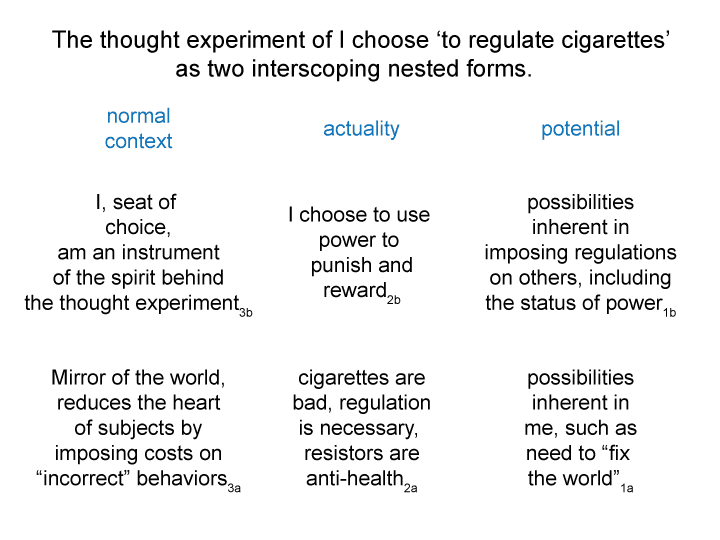Man and Sin by Piet Schoonenberg (1964) 2.3 QJ
[In so-called “welfare”, the subject conforms to the words of the sovereign authority’s thought experiment (that providing the transfer payment will achieve greater “equity”).
For the subject, freedom and responsibilities transform into bondage and words.
For the government agent, words and bondage for the subject are perceived as the justified application of an objectorganization onto sovereign subjects.]
Man and Sin by Piet Schoonenberg (1964) 2.3 QI
Summary of text [comment] page 83
[Freedom2a(1a)) to get welfare payments2a goes with words3a(2a.
The subject’s heart is bound to the words of the criteria.
Lawyers may be required to figure out those words.
So, freedom from want2a(1a) translates into bondage2a(1a)).]
Man and Sin by Piet Schoonenberg (1964) 2.3 QH
[The subject, who wants something2a, accepts dehumanization from the sovereign religion. The subject considers something2a to be free (without responsibility, especially, without working for it).
Consequently, the subject will arrange “his” circumstances to satisfy the criteria of any welfare agency.]
Man and Sin by Piet Schoonenberg (1964) 2.3 QG
Summary of text [comment] page 83
[Can we imagine what the criteria must be?
Well, for one, the transaction would never occur in the open market, even one livened by the yeast of diverse Christian factions. For Christians, there is no “welfare” or “entitlements”. There is only “charity”.
Christians fail their mission at the moment when charity becomes dehumanizing.]
Man and Sin by Piet Schoonenberg (1964) 2.3 QF
Summary of text [comment] page 83
[Now, here comes a different example.
Let me consider the example of “welfare”, defined as transfer payments from (an imputed bad one) to an imputed good one.
Something2a is making funds available according to certain criteria for subjects2a.
Does that sound more humane than forcing subjects to stop smoking cigarettes?
Still, the government agent dehumanizes.
Who is the subject that fits a particular criteria?
A dehumanized person is.]
Man and Sin by Piet Schoonenberg (1964) 2.3 QD
[The me1a who is capable of imposing costs and regulations on subjects2a is also capable of dehumanizing others3a.
The imposer’s I, seat of choice3b, situates the normal context of the mirror of the world3a as ”his” own3b. The imposer is courtier to the king.
The imposer imagines that “he” both owns and is owned by the mirror of the world.]
Man and Sin by Piet Schoonenberg (1964) 2.3 QC
[What does this imply?
The imposer dehumanizes the subject. The subject is reduced to an entity responding to costs and regulations.
Does this not sound like economic humans as utility maximizers?]
Man and Sin by Piet Schoonenberg (1964) 2.3 QB
Summary of text [comment] page 83
[I want to examine the perversity of the imposer
An imposer is a person who joins the sovereigninfra in order to impose ‘the object that brings subjects into organization onto the subjects of the realm’.
What is ‘the something2a’ that this person chooses?
Let’s say, with the tobacco example, ‘something2a’ is ‘really expensive cigarettes that are hard to get’. So this person lobbies for increased transaction costs (taxes, restrictions on use, and so on).]


